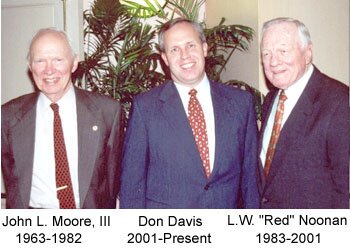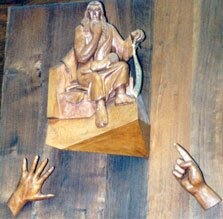
Mosaic originally installed at the Royal Street entrance to the now demolished
Mobile County Courthouse has been re-installed in the Atrium of the Mobile Government Plaza
History of the Court
When Mobile County became a part of the United States, a five member "County Court" was established, and the Judge of Probate was the presiding officer of the County Court. This court, like its counterparts in most other Southern states, was also the chief administrative and legislative body in the county and an inferior court with limited civil and criminal jurisdiction. In 1821, the composition of the County Court was changed from five justices and a clerk to one "County Judge" and a clerk. At the same time, a separate "Court of County Commissioners" was established, consisting of four commissioners and the County Judge. This arrangement provided for some separation of the judicial function from the administrative and legislative function at the county level. The County Court was vested mainly with the same judicial powers of its predecessor, and the County Judge was assigned the same powers formerly exercised by the chief justice of the former inferior County Court. The administrative and legislative functions, such as control over roads, bridges, ferries and the management of public buildings were assigned to the new Court of County Commissioners.In 1850, a court of probate, as we know it today, was established in each Alabama county. The positions of clerk and judge of the County Court were consolidated into an office of "Judge of Probate." Unlike the County Judge who was appointed for a six year term, the Judge of Probate was to be popularly elected for a term of six years. Jurisdiction of the former County Court was for the most part transferred to the Probate Court, the major exception being civil and criminal jurisdiction, neither of which were vested in the new Probate Court. The Judge of Probate was given the authority formerly exercised by the County Judge and Clerk of the County Court, with authority to appoint his own clerk. Like his predecessor, the Judge of Probate was made a member of the Court of County Commissioners. At one time, the Judge of Probate had jurisdiction over juvenile, welfare, desertion and non-support cases and matters. As time progressed, these duties and responsibilities were transferred to other courts and governmental entities.
As Mobile County grew and became the second most populous county in Alabama, the duties and responsibilities of the Mobile County Judge of Probate were augmented. The Judge of Probate ceased serving as chairman of the Court of County Commissioners (now called the Mobile County Commission) and the jurisdiction of the Mobile County Judge of Probate was expanded to enable the Mobile County Probate Court to hear and rule upon some judicial matters that were being heard by judges of the Circuit Courts. As these changes occurred, it was recognized that a person "learned in the law" should serve as Judge of Probate, consistent with requirements relating to judges of the Circuit Court. Mobile and Jefferson Counties are the only two counties in the State of Alabama where it is required that the Judge of Probate be licensed to practice law. Further, in a number of Alabama counties today, the Judge of Probate continues to serve as chairperson of said counties' board of commissioners.
Previous Judges of Probate (and Presiding Judges of County Court)
| ...........JUDGE | YEARS SERVED | . |
| Josiah Blakeley | 1813 | Chief Justice of the County Court |
| Alvin Robeshow | 1816 | Chief Justice of the County Court |
| Cyrus Sibley | 1820 |
Chief Justice of the County Court
     |
| Thomas Murray | 1821-1822 | |
| William Hale | 1823-1832 | |
| William M. Garrow | 1833-1836 | |
| John F. Everitte | 1837-1842 | |
| George F. Lindsey | 1842 | |
| John A. Cuthbert | 1843-1848 | |
| Joseph Seawell | 1848-1850 | |
| Edwin Rust | 1851-1854 | |
| Jonathan A. Hitchcock | 1855-1860 | |
| George W. Bond | 1861-1866 | |
| **HISTORY NOTE! Former Confederate States of America Admiral, RAPHAEL SEMMES was elected Judge of Probate in 1867 ... But Federal Authorities WOULD NOT PERMIT HIM TO SERVE! | ||
| Gustavus Horton | 1867-1873 | |
| Price Williams, Jr. | 1874 - 1914 | |
| Price Williams | 1915-1937 | |
| Matt A. Boykin | 1938-1940 | |
| Norvelle R. Leigh, Jr. | 1940-1950 | |
| William C. Taylor | 1950 | |
| Walter F. Gaillard | 1950-1954 | |
| T. L. Griffin | 1954-1955 | |
| Vernol R. Jansen | 1956-1963 | |
| John L. Moore, III | 1963-1982 | |
| L. W. "Red" Noonan | 1983-2001 | |
| Don Davis |
2001- present | |
 |
||
Major Areas of Responsibility
The major areas of responsibility of the Mobile County Judge of Probate are as follows:
| Judicial | Adoptions and Contests to Adoptions, Involuntary Commitment of the Mentally Ill, Condemnation of Privately Owned Land for Public Use, Guardianship and Conservatorship Proceedings for Minor Children and Adults Who Are Mentally and/or Physically Incapacitated, and the Administration of Decedents' Estates (whether or not the decedent had a last will and testament). |
| Public Records | The Judge of Probate is the custodian of Mobile County's public records, including deeds, real estate mortgages, and the like. |
| Elections | The Judge of Probate is the Chief Election Officer of Mobile County. The Judge of Probate serves, along with the Sheriff of Mobile County and the Clerk of the Circuit Court of Mobile County, as chairman of the boards which oversee the election process in Mobile County and appoints all local election officials. |
| Marriages | The Judge of Probate is responsible for the issuance of marriage licenses. |
| Notaries Public | The Judge of Probate appoints notaries public, who are authorized to administer certain oaths and certify the execution of certain documents. |
Additionally, the Judge of Probate serves on other governmental boards, most notably the Supervisory Committee of the Mobile County Personnel Board.
Because of the nature of the judicial matters assigned to the Judge of Probate in the Alabama legal system, Alabama probate courts are commonly referred to as the "Solomonic Court." In recognition of this distinction, a wood carving depicting King Solomon graces the Mobile County Probate Court's main courtroom.

Sculpture of King Solomon by Seldon Kearns